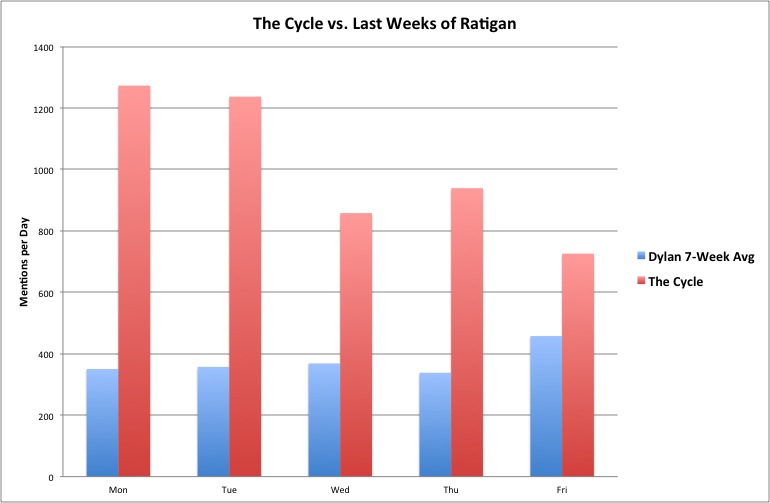On Saturday’s (9/1) Melissa Harris-Perry show, the host made an animated defense of poor people, arguing that being poor was riskier than being wealthy. It’s not surprising that her comments got a strong response from viewers, and it’s not surprising they were almost uniformly positive in their comments on Twitter. What is surprising, however, is that 24 hours later the tone of the comments on Twitter had changed from positive to negative. What happened? Were these real comments by people reacting to the video? Or was Melissa the victim of an orchestrated “attack of the clones” — a large number of identical tweets that sought to change the public’s perception of events?
Category Archives: Media
Restarting MSNBC’s The Cycle
Imagine you’ve started a new job, working for four weeks straight on a new project, and then the fifth week you get to put a couple of days in before being furloughed for two weeks. When you get back, how quickly can you get back into the swing of things?
If you’re MSNBC’s The Cycle, that’s your story. The show debuted on June 25th, and a month later was suspended so MSNBC could cover the Olympics. That’s not a great strategy for building and retaining an audience!
Melissa Harris Perry and Chris Hayes Roar Back from the Olympics
With NBC’s Olympics coverage knocking two weeks out of MSNBC’s schedule, a lot of the daytime and weekend shows were off the air for an extended period. Would viewers find something else to do during those time slots — and would they stick with the new choices after the Olympics ended?
Putting MSNBC’s “The Cycle” through the Twitter Rinse
This week saw the debut of the replacement for The Dylan Ratigan Show on MSNBC, The Cycle. And what a newsy week it was to start! So how did the gang of four do on Twitter?
Compare the daily Twitter mentions for The Cycle to how Dylan Ratigan did, on average, for the last seven weeks he was on the air:
Not bad — it’s a nice boost in activity. The Cycle’s team has definitely engaged with their audience on Twitter.
The real winner of the Wisconsin recall: Walker? Romney? How about Ed Schultz!
The failed Wisconsin recall a week ago (6/5) generated a lot of conventional wisdom: Scott Walker renewed his mandate, the unions lost, and a new dynamic was introduced into the presidential campaign that helped the Romney campaign. And from a media perspective, Fox News was crowned the winner while MSNBC and, in particular, Ed Schultz were the grieving losers.
The mood around MSNBC that night and the next day bore witness to the disappointment of the MSNBC hosts. Pundits — conservative and liberal — mocked MSNBC’s seemingly all-in bet on the recall.
Despite their disappointment being palpable, it does not mean that MSNBC “lost”. MSNBC is not in the business of getting democrats elected (as much as it may seem to be the case); MSNBC is in the business of selling its viewers to advertisers. When you look at it from the perspective of ratings and social media, the night becomes a win for Ed Schultz.


